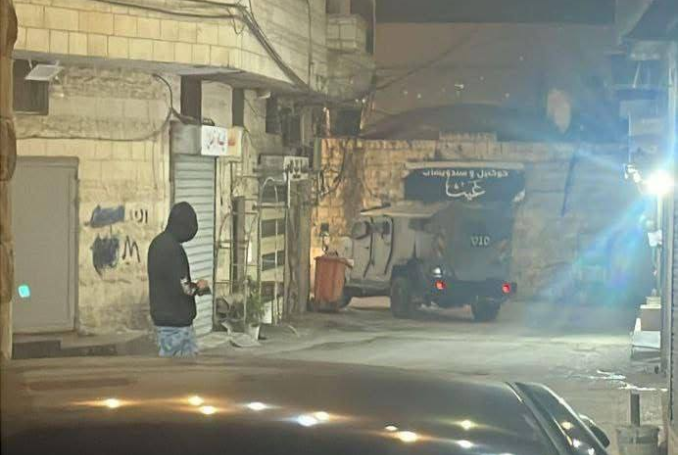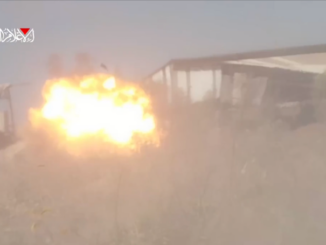
By Ramzy Baroud 
Israel’s escalating military campaign in the West Bank, coupled with the PA’s complicity, sets the stage for a pivotal confrontation in Palestinian resistance.
The Israeli army continued its onslaught on the Jenin refugee camp, a military campaign that began almost immediately after a Gaza ceasefire was announced.
Though the epicenter of the campaign remains in Jenin, where many Palestinians have been killed or wounded, major West Bank cities have also been raided.
Israeli raids have reached numerous villages and refugee camps, leading to the arrest of many Palestinians.
The Palestinian Authority (PA), which has long acted as a supposed vanguard of Palestinian rights, is actively participating in the Israeli campaign. In fact, the PA was involved in pacifying the Resistance in Jenin and other West Bank areas prior to Israeli attacks, seemingly setting the stage for a larger Israeli military crackdown.
PA Role
The irony is that the PA named its operation in Jenin, which extended from December 5 to January 21, “Protecting the Homeland.” Yet, the operation merely tried to pacify the “homeland,” making it easier for the Israeli military mission to follow through.
The degree of PA violence against Palestinians in the West Bank is increasingly comparable to Israeli violence, further cementing the claim that the PA is, in fact, a tool of control used by the Israeli occupation against Palestinians.
In 2007, Gaza rebelled against the PA in what was erroneously dubbed at the time as the Hamas-Fatah clash, with Fatah being the dominant party in the PLO and the faction of PA President Mahmoud Abbas.
It is unclear whether a similar rebellion against the PA is possible in the West Bank, at least for now, considering the Palestinian population there faces three tiers of violence: the Israeli army, armed illegal Jewish settlers, and Abbas’ security forces.
Hoping to “preserve Palestinian blood,” the Jenin Resistance had agreed, on January 14, to sign an agreement with the PA, allowing PA forces to enter Jenin without confrontation, as long as they refrained from taking violent measures against the Resistance. The PA reportedly reneged on the agreement, leaving parts of Jenin open to Israeli military entry.
The days of urging the PA to prioritize national unity over its “security coordination” with Israel are over, as Palestinians now see the PA as an integral component of the Israeli army.
The Timing
But why is Israel attacking the West Bank, and why now?
The Israeli military operation in the West Bank, codenamed ‘Iron Wall’, was ostensibly carried out for the sake of “destroying terrorist infrastructure in Jenin,” and preventing another October 7, according to Israeli security sources cited by Channel 14.
However, this cannot be true. Even with heightened resistance in the northern West Bank, the region appears unprepared for an October 7-like Al-Aqsa Flood Operation.
The logic of the ‘Iron Wall’ lies more within the political and psychosocial realms.
First, Israel was defeated in Gaza, an unprecedented defeat in the history of the country, according to David K.Rees, writing in The Times of Israel. From the official Israeli viewpoint, the psychological impact of that defeat requires immediate action to prevent Israeli society and media from dwelling on its larger and long-term consequences.
This is partly why Israel is attacking the West Bank, which, at least for now, represents the soft belly of Palestinian resistance, partly due to PA repression.
The same logic can explain why Israel has agreed to a ceasefire in Lebanon while advancing unopposed in Syria.
Israeli muscle-flexing is largely aimed at sending a message of power and control to the Israeli public, which has lost faith in its army, intelligence, and political institutions.
Second, the Israeli operation in the West Bank is part of a political trade-off between Israeli Prime Minister Benjamin Netanyahu and extremist Finance Minister Bezalel Smotrich. The latter, though opposed to the Gaza ceasefire, remained in the government, bolstering Netanyahu’s fractious coalition.
Unlike Minister of National Security Itamar Ben-Gvir, who resigned along with his Otzma Yehudit (Jewish Power) party, Smotrich stayed, on the condition of carrying out a major military operation in the West Bank, paving the way for further expansion of illegal settlements.
This exchange benefits both Smotrich and Netanyahu. Smotrich can now rally more followers to his far-right base, claiming to have stood firm on Israel’s national security in Gaza while suppressing Palestinians in the West Bank.
For Netanyahu, it’s also a way to keep Smotrich’s supporters happy, as the rise of Smotrich’s base could weaken Ben-Gvir’s influence, as both vie for the same constituency.
New Intifada?
While Israeli leaders ramp up violence in the West Bank for political gains, they are not paying much heed to warnings from military and intelligence leaders.
On January 9, for example, Israel’s Channel 12 reported that Chief of Staff Herzi Halevy and senior officers warned the war cabinet that the West Bank is on the brink of an explosion, and that tensions could lead to a “a third intifada (uprising).”
Indeed, Israel’s miscalculation in the West Bank could potentially lead to a much-anticipated popular uprising, which, if it occurs, will be difficult, if not impossible, to control according to Israeli military timetables.
Palestinian anger resulting from the Israeli genocide in Gaza, coupled with the collective sense of victory from the ceasefire, makes the possibility of an Intifada very real. If such an Intifada takes place, much of the West Bank—and Palestinian political life—would change.
The PA has already chosen sides in the upcoming conflict. The Israeli government, reeling from the Gaza defeat, is ready to engage in more military gambles. The world continues to watch in silence, as it has during 471 of Israel’s genocides.
Will the West Bank erupt with the same vigor and determination to win against the Israeli occupation, as their brethren in Gaza have? If the answer is yes, the Israeli occupation will face another major blow, paving the road for Palestinian freedom.
(The Palestine Chronicle Managing Editor Romana Rubeo contributed to this analysis.)

– Ramzy Baroud is a journalist and the Editor of The Palestine Chronicle. He is the author of six books. His latest book, co-edited with Ilan Pappé, is “Our Vision for Liberation: Engaged Palestinian Leaders and Intellectuals Speak out”. Dr. Baroud is a Non-resident Senior Research Fellow at the Center for Islam and Global Affairs (CIGA). His website is www.ramzybaroud.net







